
Screenshot/Texas Senate
State Sen. Joan Huffman (R-Houston), April 16, 2025.
State Sen. Joan Huffman’s entry into the Republican primary for Texas attorney general makes it more likely the March 2026 race will go to a runoff. The Houston lawmaker, who announced her candidacy earlier this week, is facing off against state Sen. Mayes Middleton (R-Galveston) as well as former U.S. Assistant Attorney General Aaron Reitz.
“The great point about [Huffman and Middleton] both being from the Houston metroplex is important to both of them and also a negative for both of them,” political consultant Bill Miller said.
Miller noted that while both Huffman and Middleton can draw on vote-rich Greater Houston, they’ll also both have their work cut out for them making their names known in some of the other regions of the state that are critical in a Republican primary, particularly rural West Texas.
“Because the state is red because of rural Texas,” Miller said.
Each of the three candidates brings a different set of strengths to the primary competition. Reitz has worked for the current Texas attorney general, Ken Paxton, who is challenging incumbent U.S. Sen. John Cornyn in the 2026 Republican primary for that seat.
“He’s also been in Washington,” Miller said of Reitz. “So, he’s going to talk about the Trump connection and the Paxton connection to primary voters, because Paxton is very popular with Republican primary voters.”
Middleton brings a sizable bankroll to his contest. The Galveston senator is independently wealthy as the owner of an oil and gas company. He has said he’d be willing to put up as much as $25 million of his own money to bankroll his campaign.
Screenshot/Texas Senate
State Sen. Mayes Middleton (R-Galveston) speaks at the Texas Capitol in Austin on April 22, 2025.
“Middleton is just a down-the-line conservative,” Miller said. “He’s going to talk about his voting record. He’s done what he’s been instructed to do or wanted to do in the Senate, which has agreed with the lieutenant governor.”
Huffman comes to the race as the most experienced attorney and jurist, having spent years as an assistant district attorney in Harris County and elected state district court judge. Miller said that provides her with a critical advantage.
“The one issue that’s going to arise throughout this race from the beginning to the end is experience,” Miller said, “because the attorney general of Texas is always filing lawsuits, typically in the state against people and certainly against the federal government. As Greg Abbott and Ken Paxton will tell you, that’s kind of a way of life.”
And if Reitz can claim ties to Paxton and lesser ones to President Donald Trump, Miller said, Huffman can tout a political connection to Lt. Gov. Dan Patrick — stronger than Middleton’s — which could count for even more with Republican primary voters.
“She’s been the [Senate] finance chair for the lieutenant governor, which means that’s the top position you can get appointed to. That means that she has the closest relationship to the lieutenant governor,” Miller said. “Additionally, if you look at the finance chair, she along with the appropriations chair, they decide how you’re going to spend billions and billions and billions of dollars every two years. And much of that money goes to places and people … that she can talk about when she talks to voters, who’ve been affected by the spending at the state level.”
None of that guarantees any of the three candidates can win the Republican primary outright, particularly given how bitter the contest is likely to become.
“We haven’t had really contested Republican primaries in a while, and you’ve got one at the United States Senate level, and now you have attorney general, both significant races, significant people,” Miller said. “And I think it’s going to be interesting to see how the candidates behave and how aggressive they are, and I suspect, given the nature of politics these days, that both races will be extremely aggressive.”
If no one gets more than 50% of the vote in the Republican primary for attorney general, the top two vote-getters in March will go to a second round. Miller said this is the more likely scenario.
“I think the way to look at this is this race will not be won on Election Day,” he said. “It’s going to be a runoff race. The question is, ‘Who’s in the runoff against whom?'”

